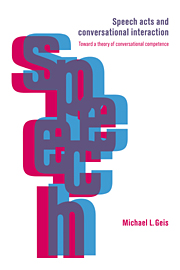4 - Interactional effects
Published online by Cambridge University Press: 16 October 2009
Summary
Introduction
In the preceding chapter, we focused on the transactional side of two types of interactions, service encounters (i.e., exchanges in which one person is trying to cause another to do something for him), and invitations (i.e., exchanges in which one person is trying to cause another to do something with him). In this chapter, we turn to consider interactional effects in interactions such as these.
The concept of an interactional effect is critical to an account of conversation in at least three ways. First, utterances appear in conversation that do transactional work, but the fact that the speaker troubles to utter them itself has interactional implications. Second, there are certain utterances that appear in conversations that seem only or primarily to do face-work. Third, certain features of the forms of transactionally significant utterances reflect the interactional effects of participant actions. In this chapter, I shall focus on the first two phenomena, reserving the third for chapter 6.
There exist two approaches to interactional phenomena of interest to us here, Brown and Levinson's (1987) politeness theory and the conversation-analytic theory of preference. According to Brown and Levinson, people have two face-needs, a negative face-need not to have their freedom of action restricted, and a positive face-need to be valued and to have what they value be valued. The importance of these observations lies in the fact that many of the actions we engage others in threaten face.
- Type
- Chapter
- Information
- Speech Acts and Conversational Interaction , pp. 97 - 120Publisher: Cambridge University PressPrint publication year: 1995



